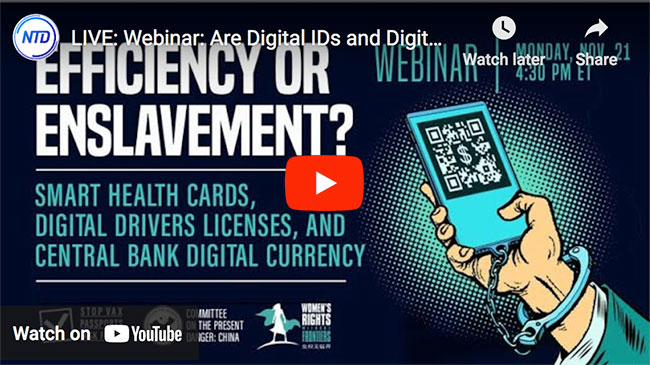GOP Senators Sound Alarm Over CBDCs, Propose Bill to Ban Them

A group of GOP Senators led by Sen. Ted Cruz (R-Texas) have introduced legislation to ban Central Bank digital currencies (CBDC) from being implemented without approval from Congress first.
CBDCs are a digital form of a country’s currency, such as the American dollar, that is backed and controlled by a nation’s central bank. Digital currency advocates say it could improve payment efficiency and expand financial inclusion for populations with limited access to the financial system.
Critics argue that CBDCs have the potential to allow new levels of government interference in people’s finances, provide new avenues for government corruption, and even potentially destabilize the economy, among other concerns.
According to the Feb. 26 press release from Sen. Cruz’s office, Sens. Bill Hagerty (R-Tenn), Rick Scott (R-Fla), Ted Budd (R-NC), and Mike Braun (R-Ind) have filed legislation to halt efforts by the Biden administration to issue a CBDC.
“The Biden administration salivates at the thought of infringing on our freedom and intruding on the privacy of citizens to surveil their personal spending habits, which is why Congress must clarify that the Federal Reserve has no authority to implement a CBDC,” Sen. Cruz said.
“I’m proud to lead the fight in the Senate to restrict the Federal Reserve’s exploration of and attempt to introduce a CBDC to the American economy,” he added.
According to the bill, the CBDC Anti-Surveillance State Act would prohibit the Federal Reserve from issuing a CBDC directly. The Fed would also be banned from indirectly issuing a CBDC to individuals through financial institutions or other third parties. If successful, the bill would leave the decision for CBDC implementation up to Congress.
Federal Government Researching CBDCs Since 2022
The Biden administration has been interested in cryptocurrencies since 2022 when an executive order was issued to study the tech and explore ways to incorporate it into the economy. The Fed and the Treasury Department have been studying the potential uses and structures for CBDCs, starting a working group to explore their applications. However, the White House has not explicitly endorsed the creation of a CBDC yet.CBDCs have received a lot of attention in recent years, sparking a fierce debate about the benefits and possible drawbacks of the technology.
Are Digital IDs and Digital Currency Efficiency or Enslavement?
Among the 55 governments that have deployed or are piloting a CBDC, many are dictatorial regimes, including Belarus, China, and Iran.
As the 2024 United States presidential election approaches, several candidates have also vowed to ban CBDCs if elected. Former President Donald Trump has promised to “never allow” the Federal Reserve to create a CBDC in the country. During a Jan. 17 campaign speech in Portsmouth, New Hampshire, he made “another promise to protect Americans from government tyranny.”
“Such a currency would give a federal government, our federal government, the absolute control over your money, they could take your money, and you wouldn’t even know it was gone,” President Trump said.
Former presidential candidate and Florida Governor Ron DeSantis also promised to ban a CBDC if elected. Speaking at the Family Leadership Summit on July 14, 2023, he pledged to ban CBDCs in the United States if elected president. Mr. DeSantis dropped out of the 2024 presidential race earlier this year.






















